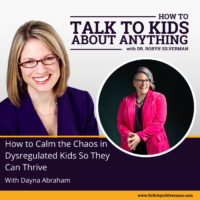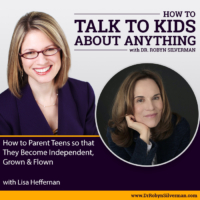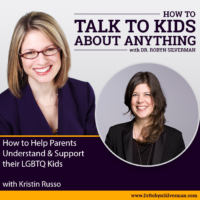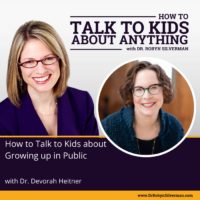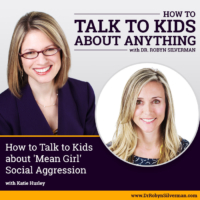Podcast: Play in new window | Download
Subscribe: Apple Podcasts | RSS | More
How to Talk to Parents about How They Discipline Kids
Mr. Chazz Lewis, or “Mr. Chazz” to his large online following, discusses how we can help hear, see, and guide children. Interviewed by Dr. Robyn Silverman on How to Talk to Kids about Anything, Mr. Chazz provides tips and scripts to help kids become the best version of themselves while parents choose dignity-directed discipline rather than harmful discipline that damages children as they grow and develop.
INTRO
It can be hard to discipline children without letting our own emotions and past experiences get the best of us. We all have emotions and sometimes they seep out in ways that makes everyone feel horrible—we might yell, belittle, threaten and perhaps some might even spank. Research consistently tells us that using physical punishment on children is detrimental to our connection with them as well as their own emotional development. There are other ways we need to explore to help our children grow to be respectful and kind. Believe me, I get it. As a parent myself, I get frustrated and worried and angry and hurt when I’m parenting my own kids. I have yelled and said things that I later have to apologize for—and apologize, I do. We are all in a state of learning here—and that’s why I am excited about my next guest, who is really helping parents to understand different perspectives and different ways of doing things when it comes to discipline, respect, emotions and parenting.
Bio
Chazz Lewis’s mission in life is to enjoy the process of becoming the best version of himself and help others do the same. He goes by “Mr.Chazz” to his large online following who he guides through understanding how to hear, see and guide children. Coming from the classrooms that he used as living laboratories, Mr. Chazz worked to develop a more conscious, informed, joyful, dignity-driven and inspired approach to learning, leading, and elevating others. He consistently provides insights into how our parental reactions are seen by children and how we can discipline in a way that helps rather than harms children as they grow and develop. You can find him on Instagram and Tiktok where he has a thriving community of followers, listen to his podcast—where I was interviewed for an upcoming episode, or on youtube.
Important Messages:
- We tend to have a really hard time with our own emotions as adults. And children are just these big balls of emotion. And so it’s really exciting to see how we can help ourselves with our own emotions and how that in turn helps children with their emotions.
- Yes! When we can control our own emotions, that will help us to really regulate our children or co-regulate with our children.
- Just want to acknowledge that we do these things with all the best intentions, right? And we need to acknowledge that unfortunately we often don’t have the knowledge or skills or even resources a lot of time to respond in a way that is more helpful, than harmful. A lot of times we end up modeling the very thing that we don’t want children to do. And so we spank a child to tell them to stop hitting. You know, the do as I say, not as I do is not effective, right? They’re, watching you and they are learning from your model. They’re learning from your example even more than they’re learning from the words.
- A lot of people say, okay, I don’t want to do what my parents did. And we’ll celebrate that. You know, like, I want to do better than what my parents did. Clap it up, celebrate pat on the back, kiss your brain. That’s when your journey really starts,
- Your examples have been more fear and control based methods rather than connection and collaborative based methods
- Dr. Robyn: when we yell at a child or spank a child, my friend Dr. Dehra Harris, who I interviewed on this podcast, calls it “pulling the emergency break.” It does get the child to stop but if we keep doing this, it wears the whole system down, right? Everything winds up getting derailed. And in certain situations, obviously you’re going to yell at a child who’s about to run out into the middle of the streets, you’re going to grab them, to make sure that they stay safe. That’s when that emergency break is warranted and needed and is appropriate.
- But in the situations that you’re talking about, it’s teaching kids that they can hit. It’s also disconnecting them, but they’re like, Hey, I want them to stop doing this behavior. They stop doing that behavior. That’s a success. So what do you say to a parent who in the moment is telling you, this is the only thing that’s working?
- There’s a difference between reactions and responses, right? And more times than not, we want to, we want to respond as opposed to react. You know, response is a real, a more thoughtful action, a thoughtful intentional action. And a reaction is just a unthought about like knee jerk reaction, right? You don’t think about, it happens in a split second. And there were times where reactions are appropriate. Like you just said, running in a street, a reaction is appropriate in an emergency, right? But more times than not, we’re not in an emergency. You know, the emergencies happen pretty rare, right? And we tend to resort to our emergency break more than there is our actual emergencies, right? We’re just driving down the highway
and we’re hitting the emergency break all the time, right? - Hitting because the child wants toy back: Fight flight or freeze mode. And not to say that fight flight or fawn are bad skills, they’re just survival skills, right? We never taught the child how to get their toy back in a more pro-social way, right? When they have another way to solve the problem- they don’t have to resort to hitting just like you’re resorting to hitting because you don’t know what else to do.
- For parent: what do you want the parent to do before they go to the child if they feel the ramp up happening in their own bodies?
- Practice a program called Conscious Discipline. Get the higher parts of their brain so that they can kind of meet our expectations. So the first thing you want to do, we automatically get shifted down to the lower states of our brain, must get back to the top. When we are in the lower parts of our brain, we’re not in a good state. We’re not in a good position to really be helpful for that child. Because if we’re in the lower states of our brain, we’re likely going to keep the child down in the lower states of their brain, and we’re just going to be two people in a survival state just fighting it out, right? And just fighting for power. And because we’re bigger, we might win that power struggle through physical aggression. But in, in the end, do we really win?
- To do: First thing you want to do is to kind of move yourself up in your brain is to pause. Because remember, reactions are going to happen in a split second. A response takes a little bit more time. This is something new for you. But even if you’ve been practicing, you’re still probably going to have to pause and take a breath, right? And, sometimes things are happening- I get triggered and I have to go handle the situation, I have to kind of move myself with my brain of my brain.
- Regulating: I am often walking towards the child while I’m regulating myself at the same time. I’m pausing. I’m taking a breath in through the nose, out through the mouth. I am trying to see the best in this child, right?
- Mantras: I’m saying maybe mantras to myself, this child’s not trying to gimme a hard time. They’re having a hard time. Mistakes are opportunities for learning. Conflict or conflict is an opportunity for learning. This is not an emergency, right? This is not an emergency. We’re safe, right?
- Address the mental models: We all have these stories, these mental models that are likely going to come up, maybe that are going to shift us, keep us down. “they’re so ungrateful. They’re so mad. They’re mean, they’re bully. You know, kids these days are so, such and such,” all these kind of narratives, these mental models that we likely grew up with, that we may have been conditioned with are might come up too.
- They don’t know how to problem solve. They don’t have the skills to problem solve in this moment. So they’ve resorted to survival skills, right? Like we often do when we don’t have the skills, right? That’s why we resort to the, the yelling, the threatening, the spanking and all that stuff- we’re having a hard time, right?
- “You’re a good parent having a hard time, right?” And so all of this is happening internally before I even say anything to the child, right?
- Practice: And it takes some practice to get there. I mean, it could take practice to even recognize you’ve downshift in your brain that you are in an emotional state, or you are in a survival state. A lot of us have been conditioned to not even recognize and be aware of what we’re in a state, because we’ve been taught to push down our emotions so much Oh, yes. And say, we’re fine. We’re fine, it’s fine, it’s fine. I’m fine. And so that a lot of times we’re not even aware of would we are frustrated. It’s just this thing that’s happening kind of subconsciously within us, but it’s still impacting all our tone, our body language, and often the words that come out of our mouth.
- Dr. Robyn: Body indicators. Where did you feel it in your body when that first reaction came out? For me, when I get angry, it’s in the pit of my stomach. And my stomach gets really tight, and I can feel it in my jaw. And even asking children, not in that moment, not even 10 minutes later, but, you know, and when everybody is calm and regulated, when you felt so angry before when you took that car and hit it, hid it over the head of your brother, where did you feel that anger? Did you feel it in your hands? Were you hot in your face? Did you feel it in the pit of your stomach? Because those early indicators, I’m getting ramped up, I’m getting angry, can then speak back to us and help us to know, oh, it’s happening again. And now I’ve gotta take that breath that Mr. Chazz told me to take. I’ve gotta pause and I’ve gotta stop start my mantra.
- Do you actually have a memory of when you figured out where that where that bubbled up for you? Greatest opportunities for learning. And those can actually really be huge gifts for us. Because without those moments, we may never really figure out what that, what our buy with that feels like when it starts to bubble up.
- Reflection: great gifts. First, learning about ourselves, remember conflicts and opportunity for learning, right? Mistakes are an opportunity for learning.
- Breathe, space breaks, vagus nerve
- Coping mechanisms. Janine Hollerin, physical, calming, sensory, distraction for calm-down options. Dr. Lynne Kenney and Wendy Young on helping kids with anger or calm down from temper tantrums.
- Child wants the wooden car. What TO do. “Turn please.” Instead of stop the behavior, transform the behavior.
- Give the words. I put my hand on my back while I’m still breath on my hand on their back while I’m still breathing to help them regulate and say you wanted a toy. You wanted the toy, right? You wanted, you wanted them to give you a turn, you wanted a toy, right? So that everybody knows you understand what is happening, and they feel seen and heard.
- Know there are more aggressive ways and more passive ways. There are passive-aggressive ways. Trying for assertiveness.
- Acronym called MAP stands for model, add, visuals and practice. And anytime you’re really, you’re trying to teach a child something or trying to teach ’em a routine or skill, mapping it out is a, is very helpful for children.
- My belief is that you can ask for a turn. A assertiveness is, is a great skill to have, but just ’cause you use the skill of a assertiveness doesn’t mean that you automatically get whatever you want all the time. It’s not the way that the skill works, it’s not the way that the world works. It is really an opening to problem solving, right?
- Flowchart style. What are the underlying needs? Connection? Choices? Celebrate the choice they make!
- Birthday party, if there’s one trampoline that is for that only two people can jump on at a time, this is a time where it would be appropriate to also probably set expectations ahead of time. Visual timer. Still be a little hard in that moment, but the intensity of that emotion is decreased if they know what to expect and when than if they don’t.
- Talk about when you’ve gotten angry, model how you deal with anger. How you are accountable.
- Top tip. The number one thing, and the most important thing I’ll say this whole session is, I’m, I’m about to say right now, perfection doesn’t exist. Avoid being a perfectionist, being a proven, the goal isn’t to be perfect every day. The goal is to improve a little every day. Learn from the past, you are like the first iPhone pretty much. And that’s a huge innovation. And again, clap for yourself, pat yourself on the back. Kiss your brain. Yes. And recognizing that part of the reason we want to celebrate that is because it’s a huge step. Because some of us were raised by blackberries, right? Oh,some of us were raised by rotary phones, adding machines even, right?
- What was the point of the software update? But, but over time, over a bunch of software updates, it’s almost unrecognizable of how much growth has happened in that time. So keep taking those baby steps. Those baby steps keep moving forward. And your children are going to be like the second iPhone.
Notable Quotables:
- “A lot of times we end up modeling the very thing that we don’t want children to do. And so we spank a child to tell them to stop hitting. But doing as I say, not as I do is not effective, right? They’re watching you and they are learning from your model. They’re learning from your example even more than they’re learning from the words.”
- “A lot of people say, okay, I don’t want to do what my parents did. And we’ll celebrate that. Clap it up, celebrate pat on the back, kiss your brain.”
- “There’s a difference between reactions and responses, right? And more times than not, we want to, we want to respond as opposed to react. You know, the response is a real, a more thoughtful action, a thoughtful intentional action. And a reaction is just an unthought about like knee-jerk reaction, right?”
- “When we are in the lower parts of our brain, we’re not in a good state. We’re not in a good position to really be helpful for that child. Because if we’re in the lower states of our brain, we’re likely going to keep the child down in the lower states of their brain, and we’re just going to be two people in a survival state just fighting it out, right? And just fighting for power. And because we’re bigger, we might win that power struggle through physical aggression. But, in the end, do we really win?”
- “You’re a good parent having a hard time.”
- “Perfection doesn’t exist. The goal isn’t to be perfect every day. The goal is to improve a little every day.”
Resources:
- All social media: MrChazz
- IG: https://www.instagram.com/mrchazz/?hl=en
- TT: https://www.tiktok.com/@mrchazzmrchazz?lang=en
- Patreon: https://www.patreon.com/Mrchazz
- Podcast: https://podcasts.apple.com/us/podcast/mr-chazzs-leadership-parenting-and-teaching-podcast/id1525418064
- https://www.mrchazz.com/



